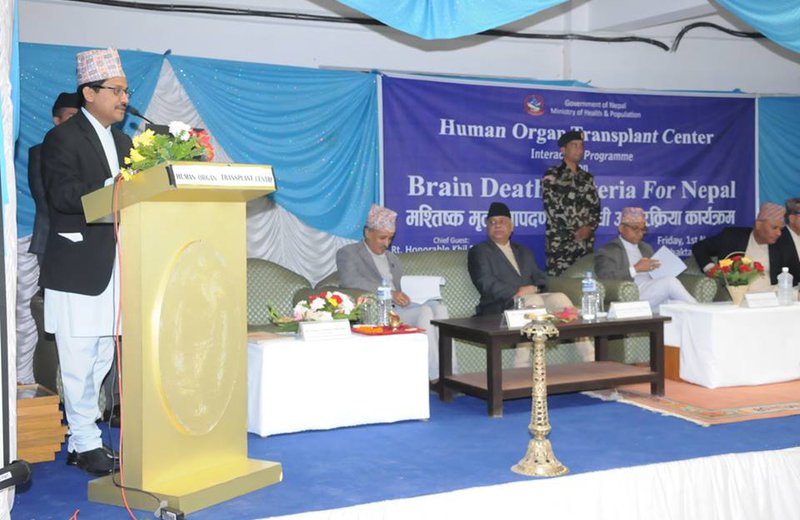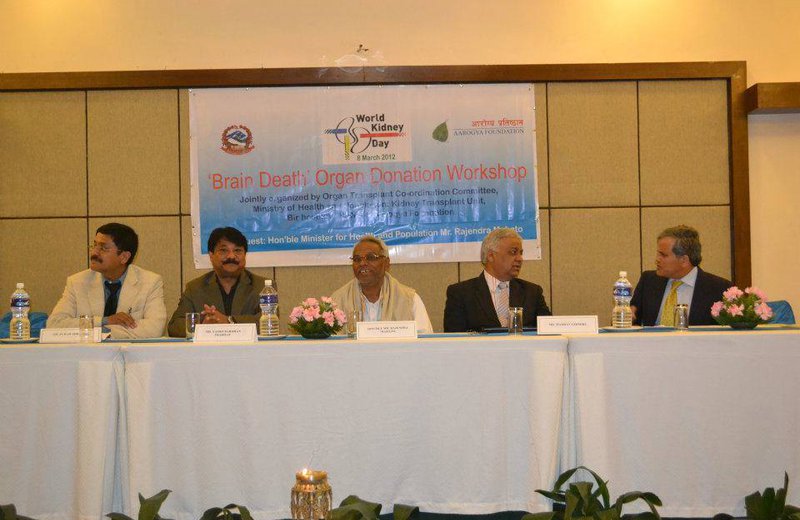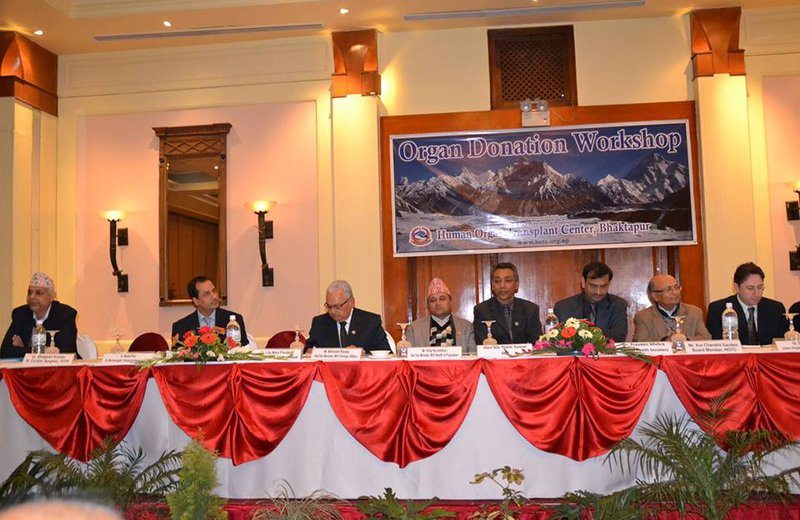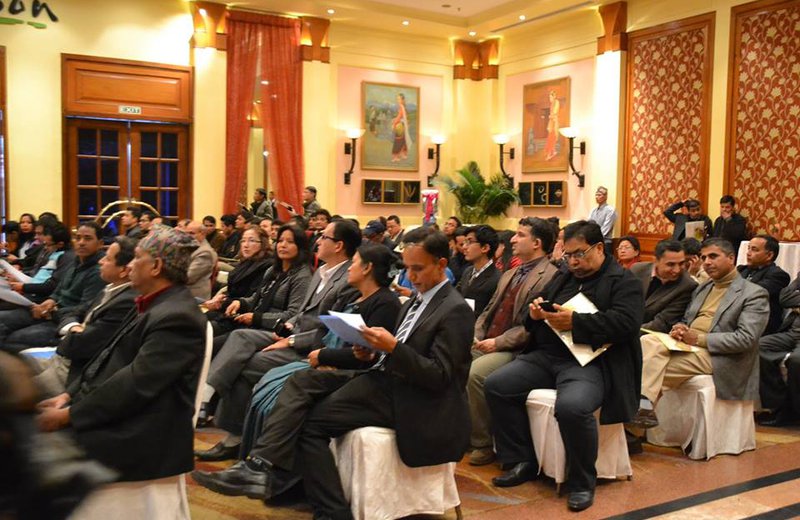NEW HOPE IN ORGAN TRANSPLANTATION IN NEPAL : THE AMENDMENT OF THE TRANSPLANT ACT 2072
Jan. 24, 2016




We are excited to share with you that our parliament has passed the amendment of Transplant Act 2072. This amendment opens the door for brain death donation, pair exchange and a wide expansion of list of live organ donor pool.
This act will tremendously increase access to those who would otherwise die within a few months of organ failure and will contribute to minimizae gender biasness. Among the new provisions is brain death organ donation, which can be a source of at least 8 major organs such as two kidneys, two lungs, one liver, one heart, one pancreas, one small intestine, two corneas and other organs and tissues. Thus, this act opens up the possibility of other types of organ transplantation.
This has been possible because of the continuous effort of Dr. Pukar C. Shrestha (Executive Director, HOTC) who has been working tirelessly with parliamentarians, government officials and clinicians since he came back from the UK seven years ago. However, his efforts have not been solitary. Over the years, many people from all walks of life have joined hands with him to help developed the kidney healthcare sector of Nepal. Since creation and passing of this transplant act was no easy feat, we would like to acknowledge the people who were involved in many different parts of the process of bringing forth the Transplant Act 2072.
Aarogya Foundation, a non-profit organization established by Ani Choying Drolma and Dr. Pukar Shrestha, has been an important player in helping increase access to kidney healthcare services in Nepal. Aarogya had organized many events to raise awareness about this issue of organ donation and transplantation through kidney walks, transplant games, organ donation workshops, and health camps every year in different parts of the country. Aarogya members Nabina Shrestha, Kul Chandra Gautam, Sudarshan Pandey, Madan Krishna Shrestha, Haribamsha Acharya, Dr. Bimal Thapa and Kush Kumar Joshi have made equally important contribution from their sides.
Human Organ Transplant Center (HOTC), established by Nepal government three years ago, has been playing a central role in developing policy on organ donation and transplantation in addition to carrying out the largest number of renal transplants every month and setting up to initiate deceased donor transplantation as well as liver and pancreases transplant in future.
This act would not have come forth without the contributions of dedicated clinicians like Dr. Kalpana Shrestha, Dr. Anil Baral, Dr. Rakesh Verma, Dr. Upendra Devkota. Dr. B D Jha, Dr. Basant Pant, Dr Modnath Marhatta, Dr. Bhagwan Koirala, Dr. JP Agrawal, Dr. Tirtha Raj Burlakoti, Dr. Senendra Raj Upreti, Dr D B Shah, and Dr. Bhoj Raj Joshi.
Chairperson of Women’s, Children and Social Welfare committee of Parliament, MP Ranju Jha, Education minister Giri Raj Mani Pokhrel, Health Minister Ram Janam Chowdhary, NMKP Chairman Narayan Man Bijukshhey, MPs, Radhyshyam Adhikari, Rabindra Adhikari, Ram Narayan Bidari, Ramesh Lekhak, Rajendra Pandey, Former Ministers Rajendra Mahato, Mahendra Pandey, Vidyadhar Mallik, Khag Raj Adhikari, Health secretary Shanta Bahadur Shrestha, Law Secretary Shesh Raj Sharma, Secretary at Council of Minsters Mr. Komal Shali Ghimire, former health secretaries specially Dr. Praveen Mishra, Dr. Sudha Sharma, and former MP Binda Pandey all played a crucial role to bring this amendment.
Chief Justice Kalyan Shrestha and former chairman of council of Minister and former Chief Justice Khil Raj Regmi have also contributed immensely to amend the organ transplant act. Former Minister Mr. Madhav Ghimire, and Former chief secretary Mr. Lila Mani Paudel had facilitated this campaign.
We have to also greatly thank Prof. D Talbot and Mr. Dave Rix, consultant Transplant Surgeons; and Dr. Alison Brown and Dr. N Torpey, consultant transplant nephrologists from the UK who trained Dr. Shrestha on modern transplantation in the UK. Prof . Dr. Sandeep Guleria and Dr. Dinesh Khullar from India had supported to grow transplant program in Nepal. Lastly, we would like to thank Dr. Dorry Segev from Johns Hopkins University, USA and Dr. Jri Fronek from Prague, Czech Republic who visited Nepal to help initiate deceased donor transplantation and laparoscopic donor work in the country.
Media personnel Rabindra Mishra, Sudhir Sharma, Dilbhusan Pathak, Atul Mishra, P R Joshi, Laxmi Maharjan, Saroj Dhungel, Hari Devi Roka, Binita Dahal, Deepa Dahal, Narayan Kilambu, Bhagbati Timilsina, Ram Prasad Neupane, Makar Shrestha, Prakriti Adhikari, Suraj Singh Thakuri, Ishor kaji Khaiju, Lila Shrestha, Ramesh Giri, Puskar Budhathoki, Som Sharma Bajgain, Visa Kafle, all played a significant role to bring this act.